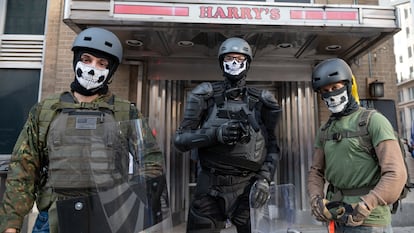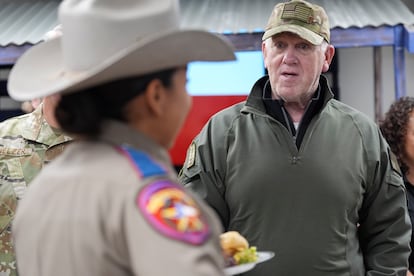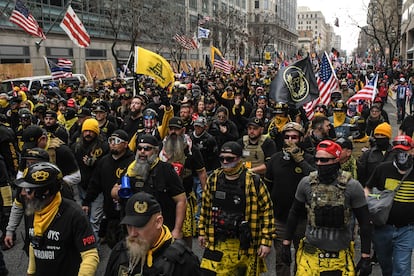Militias on US-Mexico border offer to help Trump with mass deportation plan
Armed civilian groups that are already patrolling the area in search of illegal migrants are hopeful that they will be asked to officially cooperate with the president-elect’s immigration agenda


Along the vast southern border, in the deserts and on the banks of the winding river, there are well-known armed men who look like soldiers or members of the Border Patrol, but are not. They are vigilantes. Organized in numerous groups with slightly different characteristics, from veterans of the armed forces to sympathizers of QAnon conspiracy theories, they are united by a far-right ideology and the conviction that they are protecting the integrity of the country against an “invasion” of migrants. Militias are at the center of the founding myth of the nation, and modern versions have existed for more than four decades, but in recent years and in the heat of Trumpism, their activity has increased notably: although there is no clear figure, it is estimated that there are at least around 200 such groups. And now, with Donald Trump’s second term and his plan for mass deportation looming large — the president-elect claims he will expel all illegal immigrants, who number 11 million according to official figures, although Trump says without evidence that there could be as many as 25 million — the militias have offered to help with this operation in any way necessary.
“Good patriots,” the “border czar” Tom Homan calls them. “There are thousands of retired agents, retired border patrol agents, retired military that want to come in and volunteer to help this president secure the border and conduct deportation operations,” he said in an interview on Fox News a few days after being appointed to his new post by the president-elect. There are many questions about the viability and legality of cooperation between armed civilian groups and federal immigration forces, but given the scale of the task that the president-elect has promised — which initially includes declaring a state of emergency to be able to use military funds and deploy soldiers, as well as the difficult-to-fulfill pledge to hire 10,000 new border patrol agents, among other measures — the willingness of both parties seems clear. “We’re in talks with a few different people. We have a better lay of the land than the federal agents do,” Tim Foley, the leader of Arizona Border Recon, a “civilian patrol group” that, like several other groups, reportedly has dozens of members skilled in tracking as well as sophisticated camera and drone equipment, told Wired magazine.

Beginning to emerge from the shadows now — although in the recesses of the internet their activities are no secret, and videos of them detaining migrants to hand them over to the Border Patrol are relatively common — border militias may be beginning to write the next chapter in their history. Already in the first decade of the 21st century, these groups, which formed in the 1980s motivated by deep suspicions about the federal government, set their sights on the nearly 2,000-mile border that separates the United States from Mexico. Since then, they have sporadically featured in news stories that remind us of their presence and sinister potential: in 2009, three members of a vigilante group called Minuteman Civil Defense Corps killed a nine-year-old girl and her father in Arizona — two of them were sentenced to death and another to life behind bars. Ten years later, in 2019, the head of the United Constitutional Patriots was arrested on gun charges after a video circulated showing the group holding 200 migrants at gunpoint; and just weeks ago, two militia members were convicted of conspiring to kill Border Patrol agents they accused of failing to secure the border.
Despite this, in many instances the militias operate with the tacit consent of local authorities. Sheriff Mark Lamb of Pinal County, Arizona, for example, is a well-known voice in favor of border vigilante activities. His son, Cade Lamb, is the founder of Sonoran Asset Group, another militia that nevertheless describes itself as a political consulting firm, according to an investigation by the Texas Observer. Some videos in which Cade Lamb harasses and threatens humanitarian groups that help migrants, accusing them of colluding with “fake asylum seekers,” were used by his father in his failed campaign for the Senate this summer.
Lamb is a constitutional sheriff, meaning he believes sheriffs have ultimate authority and are accountable only to God, not the federal government. And there are dozens of other officers who share much of Lamb’s thinking, many of whom personally know “border czar” Homan, who for years was a border agent and who says he has been inundated with messages of support from former colleagues who are now sheriffs, troopers, or retired officers but eager to return to help patrol the border.

Against this backdrop and with Trump’s inauguration looming ever closer, the militiamen are confident that they will receive the government’s blessing to continue and expand their border surveillance activity. According to Wired, a closed Telegram group that brings together members who identify themselves as members of different militias has exploded with conversations about Trump’s plans. “I’m going to be extremely happy if they would deputize civilians in the war on invasion from the borders,” one wrote. “Yes sir, I’ve been inquiring into that [with] some close to this admin,” another replied. “Something has to be done as [the] issue is massive and manpower needed will be huge.”
When another person suggested that militia members suspend operations and let official forces do their job, he was accused of being a “federal” or a “victim of stand down psyops.” “Anyone caught discouraging Patriots from uniting Constitutionally on a massive scale is suspect,” they wrote.
These types of messages have spread across other social media as well. “The unconstitutional, illegal, intentional border invasion is the true insurrection, therefore the insurrection act should be used and the Militia/Military should be called up to put it down immediately,” one person wrote on Truth Social last week. “Godspeed MAGA Militia!!” And the Proud Boys of South Texas reposted a meme showing a group of soldiers riding on the back of a truck, with the caption: “The boys and I when we’re deputized as ICE under Trump’s second term.”

The Proud Boys are probably the best-known militia, thanks to their role in the assault on the Capitol on January 6, 2021, when the then-president directly addressed the members of this group and gave them the order to “stand back and stand by.” Many of them, including several of their leaders, such as Enrique Tarrio, are now in prison along with members of other groups, such as the Oath Keepers, convicted of insurrection and sedition for their actions that day.
President-elect Trump considers them unfairly imprisoned and there is much expectation about whether he will pardon them, especially after Joe Biden’s pardon of his son Hunter a few days ago. “Does the Pardon given by Joe to Hunter include the J-6 Hostages, who have now been imprisoned for years? Such an abuse and miscarriage of Justice!,” he posted on his social network, leaving the door open to his own pardon for the imprisoned insurgents. His relationship with these groups may become official and even closer if he accepts their collaboration in the plan to carry out “the largest deportation in history.” Judging by the words that have been said in this regard, it is likely that at least an attempt will be made. The question is what legal barriers can be raised to prevent it.
Sign up for our weekly newsletter to get more English-language news coverage from EL PAÍS USA Edition
Tu suscripción se está usando en otro dispositivo
¿Quieres añadir otro usuario a tu suscripción?
Si continúas leyendo en este dispositivo, no se podrá leer en el otro.
FlechaTu suscripción se está usando en otro dispositivo y solo puedes acceder a EL PAÍS desde un dispositivo a la vez.
Si quieres compartir tu cuenta, cambia tu suscripción a la modalidad Premium, así podrás añadir otro usuario. Cada uno accederá con su propia cuenta de email, lo que os permitirá personalizar vuestra experiencia en EL PAÍS.
¿Tienes una suscripción de empresa? Accede aquí para contratar más cuentas.
En el caso de no saber quién está usando tu cuenta, te recomendamos cambiar tu contraseña aquí.
Si decides continuar compartiendo tu cuenta, este mensaje se mostrará en tu dispositivo y en el de la otra persona que está usando tu cuenta de forma indefinida, afectando a tu experiencia de lectura. Puedes consultar aquí los términos y condiciones de la suscripción digital.








































